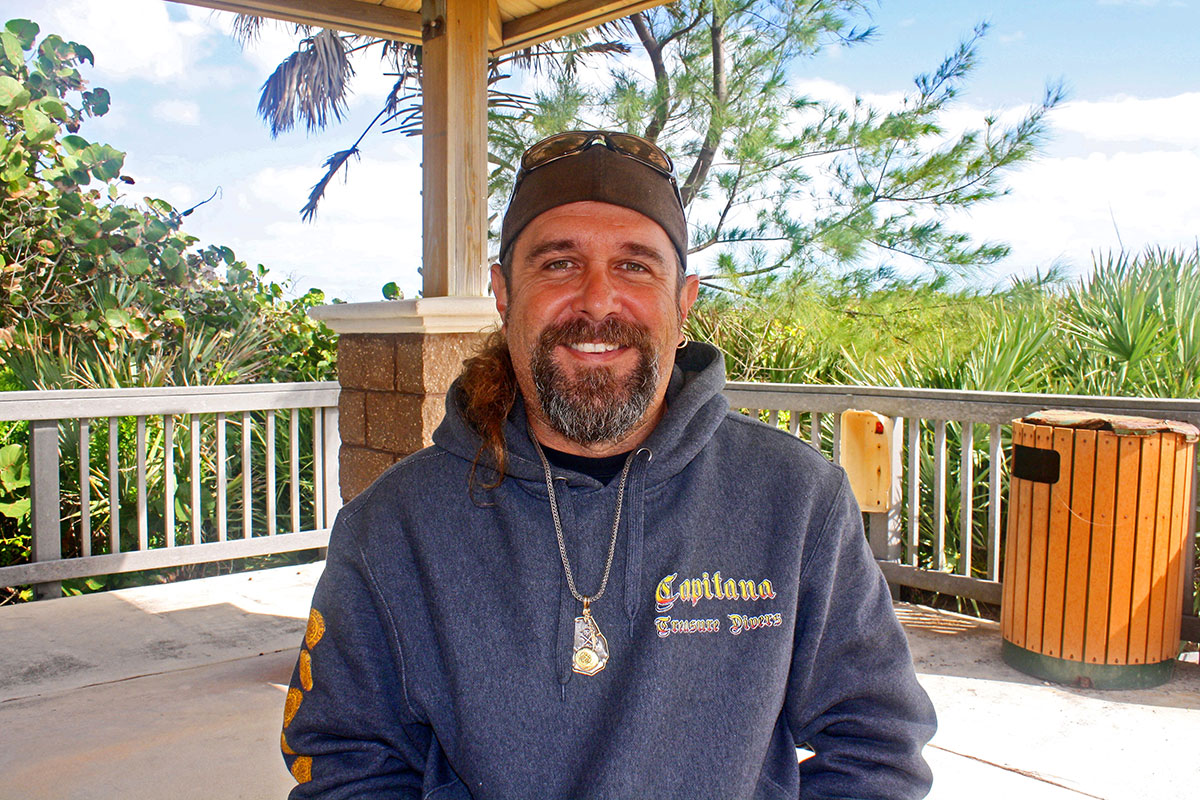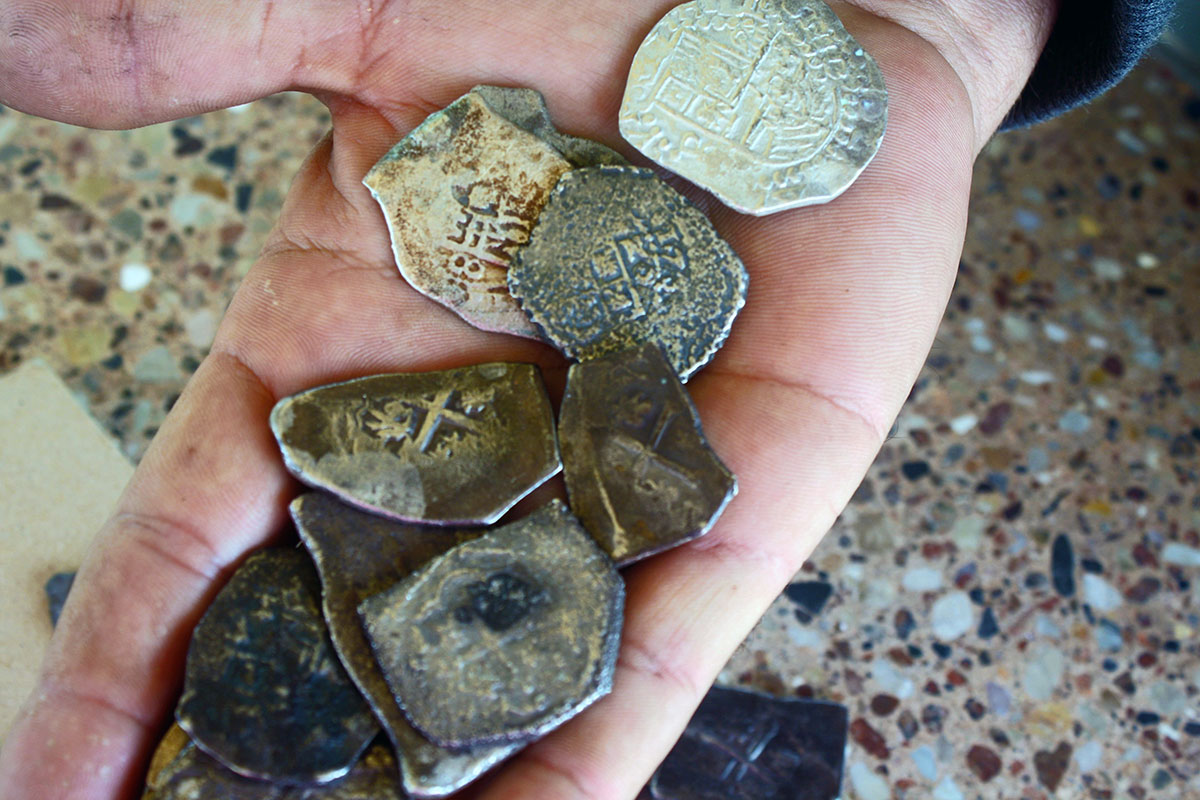The TREASURE HUNTER

BY ELLEN GILLETTE
Born into a routine life, Jonah Martinez was 10 when his father sold his business in Illinois and commissioned a sailboat to be built in Taiwan. But after a typhoon hit the boatyard, his father had to improvise.
“Dad packed us up into a camper to go on tour,” he says.
While Martinez’s mother home-schooled him and his brother, their education was enhanced by traveling throughout Mexico and South America. After the sailboat arrived, it was rigged and set up in Fort Pierce and the family finally left for the islands.
“I was hardly back in this country until my junior year of high school,” he says.
Martinez’s nontraditional childhood became the foundation for a nontraditional life. The family sailed throughout the Caribbean and the Gulf of Mexico, along the west coast of Florida and to the Keys.
“We’d dive and spearfish areas so full of fish and lobster, you could place your order for dinner and then go get it,” he recalls.
At 14, he visited the Mel Fisher Maritime Heritage Museum in Key West, amazed by the shipwreck artifacts found by the famous treasure hunter.
“As a kid, you’re fascinated with pirates and treasure,” Martinez says, “but as you get older, you focus on car payments and mortgages. I knew that day, that this was what I wanted to do. I never outgrew it.”
The family later settled in Martin County, which was an adjustment for Martinez. The lifestyle was so different — people “going places and doing things that don’t mean anything in the grand scheme of things,” he says.
On land, however, he discovered remote-control cars. He gradually transitioned to doing custom work on real cars and as a teenager, landed a job at an ornamental welding shop.
When Martinez was 17, his mother showed him a newspaper ad: A treasure ship — the Endeavor — was hiring.
“It changed my life,” he says. And as the youngest crew member, he pulled lots of ropes before finding his first silver coin, which was a turning point for him.
Several seasons later, Martinez was offered a position on one of Mel Fisher’s boats. For three years, he divided time between treasure hunting and his own metalwork.
“It was great experience — I learned how to navigate, to read the water and the weather,” he says. “On days off, while the others were at the bar, I’d dive in the harbor, finding stuff.”

When his business took off, Martinez quit the boats for six years, opting to hunt for treasure on the beach. Never a 9-to-5er, though, he couldn’t stay away. Today, Martinez is captain for Capitana Treasure Divers.
“I tell investors to repeat after me: ‘This is the worst investment I’ll ever make.’ But in 24 years, it’s worked out — sometimes a life-changing season. It’s a passion for me and our guys. We keep learning more, increasing our odds.”
Treasure hunters are a different breed, says Cole Smith, one of Capitana’s divers. “We don’t punch a clock or get a paycheck.”
And although no one wants to see a hurricane or tropical storm cause destruction, treasure hunters love it when one skirts the coast. When Hurricane Dorian ripped through the Bahamas last year, Martinez watched and waited on a Florida beach. Finally his wife called to ask when he’d be coming home. Martinez told her, “I don’t want to be here when a hurricane hits, but I damn sure don’t want to be anywhere else.”
In 2015, Capitana made headlines with a $6.5 million find in gold coins. Three hundred gold coins were also recovered from a Spanish ship on the 300th anniversary of its sinking. Treasure hunters may find gold, silver, emeralds, diamonds … or spend thousands of dollars and find nothing.
Treasure hunting involves hours of work, sometimes in bone-chilling cold. Weather is scrutinized.
“A north wind pulls the sand off the coast; an east wind adds it back,” Martinez says. “You have to find the window where you have the best chance to find something.”
After a cold front moved through in February, Martinez and others were on the beach waiting for low tide at 1:30 a.m. Martinez was knee-deep in the water when his feet hit a gravely patch. He found a coin, then another, then more. In three hours, Martinez recovered silver coins, musket balls, spikes and nails and melted lead.
“The waves were coming in so hard that for every four targets I’d get, I recovered one,” he says. “It was awesome for that little time window. I was at the right place at the right time. It felt good knowing I’d done everything right and found really cool stuff. It makes you feel special.”
It also helps to have years of experience.
“If the wind just feels right at 2 a.m., I head to the beach.”
There is magic in recovering treasure, but it is magic requiring preparation, patience and a unique perspective on life.
JONAH MARTINEZ
Age: 43
Lives in: Port St. Lucie
Occupation: treasure hunting, custom metalwork
Education: home-schooled, graduated from Martin County High School; some classes at Indian River State College
Family: Wife Maria and three children: Amanda, John and Kaylee
Hobbies: “I build things out of metal, collect marbles and enjoy remote control cars.”
Who inspires me: “My parents always encouraged me to chase my dreams. And there are a few guys whose names always come up in the treasure-hunting business: Steve Hancock — almost a hermit, but he metal detects every day and has a sixth sense; and John Brandon — no real job since he was 16. He’s spent his whole life doing this.”
What people don’t know about me: “I’ve never been superstitious, but some days at the beach or on the water you feel things, a kind of energy, something magic. At first it scared me, but now I find it comforting.”
